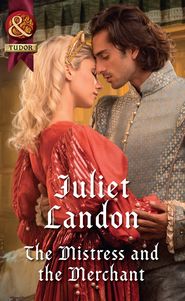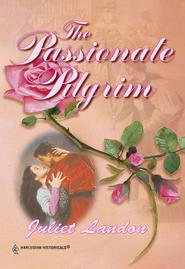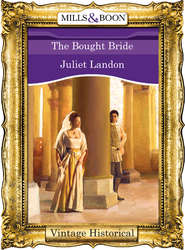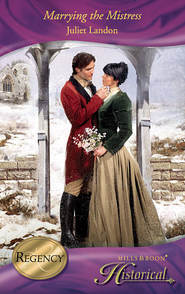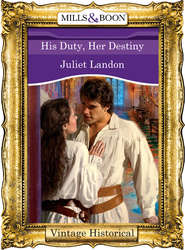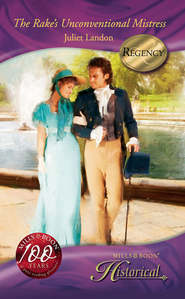По всем вопросам обращайтесь на: info@litportal.ru
(©) 2003-2025.
✖
Taming The Tempestuous Tudor
Автор
Год написания книги
2019
Настройки чтения
Размер шрифта
Высота строк
Поля
As far as the eye could see in both directions, a ribbon of colour threaded its way from the Tower in the east, past Charing Cross in the west, then round the bend of the river to Westminster, stopping at intervals to the constant blast of trumpets to allow for recitations and dances, songs and poems of praise for the young Queen Elizabeth. A crescendo of sound reached the stands and grew into a mighty roar as the waving became more frenzied. Through an arch of stone appeared a swaying mule-carried litter covered with shimmering gold cloth where, beneath a canopy carried by four courtiers, sat the new Queen, a vision of gold, white and silver, waving and smiling at the welcome.
From her vantage point, Etta saw the same bright copper hair as her own, splayed over the ermine-clad shoulders like a loose mantle of silk. She saw the same delicate skin and fine arched brows, the brown eyes that pierced the crowd as if she too was looking for one person in particular. ‘Here,’ Etta whispered into the noise. ‘I’m here.’
As if she had heard it over the din, the Queen turned her eyes upwards towards Etta and, for the space of several heartbeats, exchanged looks of curiosity and recognition, telling Etta as clearly as words that her existence was already known about. Known, but not so far acknowledged. Then the glance slid away, leaving Etta as stunned by the recognition as she was by the radiant sight, the prancing white stallions and the gleaming forest of the halberdiers’ pikes. For that moment, it had been like looking into a mirror where the reflection had a life of its own, alike in every respect except age. The Queen had been born twenty-five years ago, and Etta only twenty-one, and this was the first time their eyes had met.
Since she was a lively twelve-year-old, Etta had known something of her parentage, her sensible and loving step-parents deeming it only fair to explain to her how, from time to time, the father she had never seen, King Henry VIII, had taken mistresses. One of these had been her mother, the beautiful Magdalen Osborn, her stepfather’s first wife who had died giving birth to her one and only daughter.
But despite their explanations, Lord and Lady Raemon had never been able to fill the deep emotional void inside Etta left by never knowing either of the parents who had given her life. To the sensitive and highly intelligent child, her natural parents were the shadowy and insubstantial figures about whom only their names and a certain amount of gossip had reached her ears, some of it carelessly dropped by her nurse, tutor or elderly maid who mistakenly believed that she would not heed it. She had heeded it, avidly. Throughout her most formative years her innocent coquettishness and occasional childish vanity had drawn remarks such as, ‘She’s taking after her mama, that one’, or, ‘That’s an Osborn look if ever I saw it’ which somehow Etta knew was not meant to be complimentary, for since she was scolded for these childish misdemeanours, it stood to reason that her mother’s behaviour had been worse, in some way.
Nor did anyone realise quite how much anxiety Etta was absorbing from her step-parents’ well-intentioned oversight to provide her with anything admirable in her mother’s character to cling to. Was she really taking after her mother? How would she ever know? Her stepfather, Lord Raemon, would not speak of her mother at all; her stepmother had not known her, but it seemed to Etta as if all the world had known her father. Every now and then, some scandalous information filtered through the system to her childish ears about his various wives and their failures, about his two daughters and their unhappy lives about which she was both sad and grateful not to be in their shoes, as she might have been.
After Henry’s death, his young son Edward and then his elder daughter Mary had reigned through eleven uncomfortable years of religious turmoil, and now the younger daughter Elizabeth had appeared at last with new hopes of tolerance. Lord and Lady Raemon’s explanation of why King Henry had recognised some of his illegitimate offspring and not others, though making some sense to Etta, had done little for her wavering sense of identity. To have too many families with ties to royalty, they had said, would make the accession of his legal heirs more difficult. But although the royal rejection was not for Etta to contest, it added yet another layer of uncertainty, and some resentment, too, to her growing emotional insecurity.
‘Did the King not want me?’ she had asked her parents. ‘Did I do something he didn’t like? Was it my mama he fell out with, as he did with the two Princesses’ mothers?’
‘No, dearest. Nothing like that. Your mama died giving birth. The King was too sad to want to see you, I suppose.’
That, however, was not quite enough to settle the questions, once and for all. ‘Well, the new Queen doesn’t seem to be in a hurry to see me, either,’ she observed. ‘I can’t help but feel there must be another reason.’ When she had expressed to her parents a hope that Elizabeth might send for her, even if only to put right her father’s omission, Lord Raemon had not seen any reason why she should. ‘It’s early days yet,’ he had told her. ‘She’s hardly had time to choose her ladies, never mind which relatives to recognise, and she’s unlikely to acknowledge half-siblings so soon. Be patient, Etta.’
‘I’m not asking to become her bosom friend, Father,’ Etta had replied, ‘but I long to go to court, just the same. All those interesting people surrounding her. Surely we must be alike in wanting that, wouldn’t you think?’
‘Alike in other ways, too,’ her mother said, rather unhelpfully.
‘What do you mean, Mama?’
‘Your looks, my dear. From what I’ve heard, she’s not one to welcome competition. Others might wish to exploit the likeness, but I doubt if she would.’
Etta had turned away, unable to argue the point. Only recently, she had formed a friendship with a persuasive young courtier who had obligingly recounted to her the glamorous details and doings of life at the late Queen Mary’s court, fuelling Etta’s interest and determination to become part of it, one day. With the death of that Queen, his interest in Etta had come to an abrupt end, and she could only assume that he had left the court or lost interest in her or, perhaps, been warned off by her father. She could not ask, for she had not told her father of her friendship nor sought his permission, but the idea of being given over for another woman was humiliating and it hurt.
* * *
As the tail-end of the cavalcade disappeared from view, the crowds merged and with them went all hope of catching sight of the young man, no matter how intently she looked. Like touching a scar to find out if it still hurt, Etta revisited the site of her wounded pride, telling herself that he had never mattered to her, really. She had tossed her brilliant copper hair behind her, even as her eyes had sparked with anger, and had accepted her Cousin Aphra’s sympathetic embrace with no more than a sniff.
Only that morning, she and her step-parents had parted under a storm cloud when they had clumsily mentioned the delicate subject of marriage, signalling an end to their leniency over her choice of friends and her multiple rejection of suitors. ‘Interference, Henrietta?’ her father said. ‘I’d have thought it obvious by now that what you call interference concerns your mother and me as much as you. As my daughter, you cannot continue to associate with any gallant young thing who takes your fancy. We are looking for something more for you than mere respectability.’
‘Yes, Father. So is that why you warned Stephen Hoby off? I presume it was you, for I cannot believe there was any other reason for his disappearance.’ If Etta was at a loss to know how both her father and uncle had discovered who she had been seeing of late, she was careful not to ask. Next time, she would be even more mindful of who she told. Her maid, Tilda, would never have spoken of it, she was sure of that.
Lord Jon and Lady Virginia exchanged glances. They had known Etta would challenge them, but after long and arduous hours in preparation for the three coronation days, their stamina was wearing thin. It was her stepmother who replied, hoping to delay any controversy until later. ‘Etta dear, we’re all busy. We shall continue this conversation when we have more time. Now, you go upstairs.’
‘Etta needs to know,’ said Lord Jon. He used her full name when he was being serious, but the shortened name gave her a clue to his softening tone. ‘Sit down a moment. We were aware of the young man you refer to, even though you never gave us a chance to meet him, but your mother and I thought it had better come to an end. Your Uncle George thought so too when he discovered that Hoby is heavily in debt to his tailors and probably hoped you might be able to help him out of it. A man who visits the moneylenders as often as he does is not the kind of friend a father wants for his daughter. Hoby may not have had marriage in mind, for all we know, but we thought it best not to wait to see what else he was planning. Now you have the truth of it. Go upstairs and we’ll talk some more tomorrow.’
Etta had assumed that their friendship had ended to make way for another woman, but to learn that Hoby had been using her as a lifeline for his debts was, in a way, just as insulting. There was more she would like to have said, but this was not the time, and she knew any argument she could make would not appear at its most lucid. ‘I’m sorry, Father.’ Pecking them both on the cheek, she had gathered her skirts and gone to her room where her maid was still waiting patiently to dress her with not a single word of complaint.
Etta’s step-parents had not found it easy to raise King Henry’s illegitimate daughter, but the precocious and volatile Etta remembered little of those two motherless years before her stepfather’s marriage to Lady Virginia. Yet, even from the start, they had soon identified the Tudor characteristics which, in childhood, had caused as much amusement as anxiety, and her nurses had been kept on the hop from morn till night as her physical and mental energies outran their efforts to keep up. She could behave like an angel, but there was also a wilfulness behind the smile that had more than once evoked such responses as, ‘She’s her mother’s daughter and no mistake.’
‘She’ll have to commit herself to marriage,’ said Lord Jon to his lovely wife, ‘before...well, some time,’ he added, lamely.
‘You were going to say, before she runs into some real trouble?’
‘Perhaps not that kind of trouble, exactly. I hope she has more wit than that. I just wish she’d be more careful who she favours, that’s all.’
Jon was still the handsomest man Virginia knew, even at forty-six, and her eyes caressed him as she deliberated how much she could say to defend Etta’s strong bid for independence. ‘It’s perfectly obvious now what her relationship to the Queen is, Jon. Anyone can see that she and Henrietta share the same looks, and she’ll not be too keen on having Etta appear on the scene, will she? Can you imagine how sparks would fly?’
* * *
It seemed that neither Etta nor her parents could let the matter rest there, for the subject of her future was raised again a few days later when both parents attempted to explain that it was not so much that they wished to prevent her from making friends, but that she should now allow them to say who was suitable and who was not. Why now? ‘Because of your relationship to the new Queen, dear,’ said her mother. ‘We shall have to be extra-vigilant whose company you are seen in. Surely you can understand that? Can you imagine the comments if the Queen’s duplicate were to be seen in any but the very best company? That would hardly endear you to her, would it? Your freedom of choice must come to an end some time, my dear.’
‘In other words,’ said Etta, ‘you’re saying you intend to choose my future husband for me. Would you accept that, if you were me?’
‘Heavens above, Etta,’ said her father, ‘we’ve been more lenient with you over most things than we have with the boys, but a woman’s independence comes at a price, you know. Very few daughters of noble houses are allowed to choose their husbands. London will now be bursting at the seams with a younger generation of men eager to boost their careers and fortunes by marrying well. I’m not going to let you walk straight into the lion’s den, young lady, to be pounced on by some well-dressed young cockerel with big ideas who thinks he can win you simply by making sheep’s eyes at you. From now on, your mother and I will be saying who you are seen with. If you’d told us about young Hoby sooner, we could have saved you some heartache.’
On any other occasion, the menagerie of metaphors would have made her laugh, but when Etta made no immediate reply to that, Lord Jon turned to her. ‘Well?’ he said, aware that her silence didn’t necessarily mean acceptance.
‘This lion’s den you refer to, Father. Would that be the court? As you know, I had hoped that the Queen might have sent for me, since she must know I exist. How could she not? As half-sisters, surely we could meet? Is that not what half-sisters do?’
Etta’s mother tried to soften the edges of what she feared would come as unwelcome news. ‘It’s not as easy as that, darling,’ she said. ‘Our new Queen may not be quite as eager for your presence at her court as you are, you see. At the moment, she is the Queen Bee of the new hive. Now imagine how she would respond to an even more beautiful and younger queen bee in a hive swarming with handsome young men, watching them shower her with compliments in praise of exactly the same features as herself. Do you think she’d allow that? I don’t. She won’t stand for any rivals for her affection, Etta. She’s a Tudor. You’d get the sharp edge of her tongue before you’d been there one day. I was with her when she was a child of five, when she was often with Anna of Cleves, the lady I was with for a time. I know her temper very well, believe me. You would not care for it.’
‘And you really believe she would see me as a rival, Mama? Do you not think you and Father are making too much of this Tudor temperament?’ Even as she spoke, Etta had to admit that her mother knew Elizabeth far better than she did and that she was not likely to be mistaken in this.
‘Well, the truth of the matter is that we’ve had no word of her mind on this. Until she sends for you, there’s little you can do about it.’
‘I’m sure you’re right, m’dear,’ said Lord Jon. ‘If she doesn’t send for her, the only other way Etta could be received at court is by marriage or with someone who’s already accepted there and I’m not going anywhere near the place at the moment. Far too much going on, for my liking.’
Lady Virginia sighed and arranged the fur edge of her gown to cover her knees. ‘Throw another log on, Jon, will you? If you so desperately want to see her personally, Etta, then you must marry a courtier. But you rejected the last two courtiers before you’d even seen them, I recall.’
Lord Jon dusted his hands off and kicked the log into the blaze. Etta stood up and shook out her skirts. ‘But if I were to go to court, Mama, the choice would be so much more interesting, wouldn’t it, than it is at present? I think I could do better than the Lord Mayor of Norwich’s younger son, or Lord Torrington’s middle-aged heir. They were the last two on offer. And I don’t believe a title is an advantage, either. There are plenty of nobly born people at court without them.’
‘Then what would be an advantage, young lady?’ said her father, impatiently.
‘Love, Father. If love was good enough for you and Mother, then it’s good enough for me.’ That, apparently, was to be Etta’s last word on the subject before she walked to the door and closed it quietly behind her.
‘God’s truth,’ said Lord Jon, ‘she’s behaving more and more like Elizabeth every day. We’ve been too soft with her, sweetheart.’
‘But I think that was supposed to be a compliment, Jon dear.’
‘Come here, smooth-tongued woman,’ he said, holding out a hand.
‘What?’
‘This,’ he said, taking her into his arms.
* * *
Etta’s talk with her parents had given her some food for thought, and any mention of a love match was, she knew, as unrealistic as her dreams. The unpleasant truth about the young man’s interest in money had certainly shaken her, because she’d thought herself to be better qualified in her choice of friends than anyone else. Evidently that was not the case. She had been misled by his exquisite manners and charm. It would not happen again. She adored her parents and had striven to please them in all other respects, especially so since she had learned of her royal ancestry. She had taken schoolroom lessons with the boys in an attempt to emulate the Princess Elizabeth’s scholarship in so many subjects with the sole purpose of eventually making contact with her, on her own academic level. And no matter what reservations her parents had about the wisdom of this, she could not believe that anyone of Elizabeth’s intelligence would regard her as anything but an asset, if ever the Queen chose to recognise her as someone worth knowing, on whatever level. Friend, confidante, just another relative, occasional courtier or however Elizabeth chose to recognise her, any of these would help in her quest to relate, physically, to one of her own kin. But her father’s comment about not going anywhere near court, at present, did not bode well for any of the hopes she had nurtured for so long.
* * *
Next day, he had done his best to explain. ‘Your mother and I know the royal court well enough, Etta. We both spent some time in the service of your father. I was one of his Gentlemen of the Bedchamber, and your mother was a companion to the Lady Anna of Cleves. But we were quite happy for our duties to come to an end. Edward’s reign, then Mary’s were too fraught with danger to make life comfortable, and I have no reason to believe that Elizabeth’s reign will be any easier. That’s why we never took you or your brothers there. Too many intrigues for my liking.’






